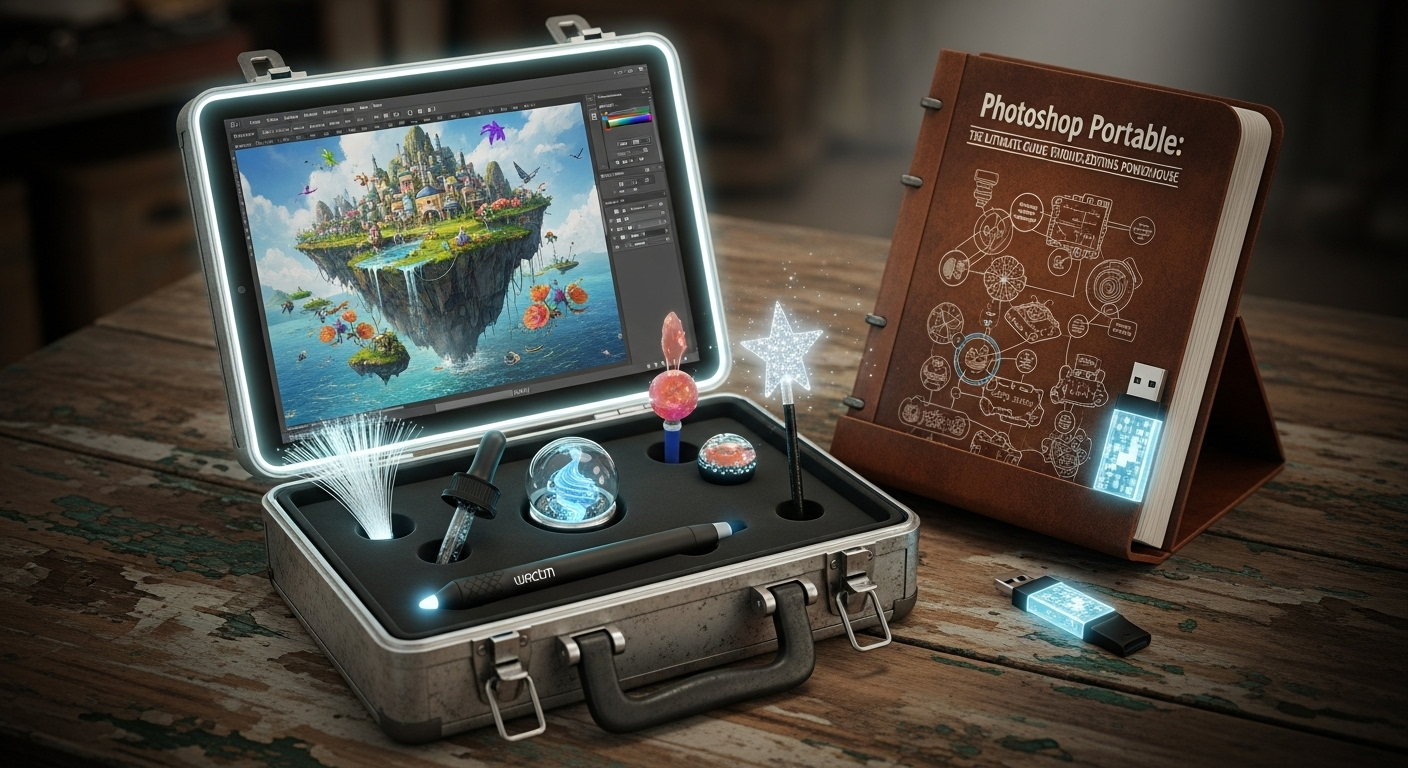
photoshop portable
Photoshop Portable is the go-to solution for users seeking the power of Adobe Photoshop without the hassle of installation. Designed for mobility and convenience, this version delivers essential photo editing features in a compact, easy-to-carry format. Whether you’re a traveling designer, a student, or simply need to edit images on the fly, Photoshop Portable offers a practical, resource-light alternative to its full version.
In today’s fast-paced world, where productivity often means being flexible and mobile, Photoshop Portable stands out as a versatile tool. In this in-depth guide, we’ll explore everything you need to know about this lean version of Adobe’s industry-standard photo editor—from how it works and what features it offers, to its pros, cons, and safety concerns.
What Is Photoshop Portable?
Photoshop Portable refers to a version of Adobe that doesn’t require installation on a computer. Typically distributed as a standalone executable, it can be run directly from USB drives, external hard drives, or even cloud storage. This makes it ideal for users who frequently switch devices or want to avoid system clutter.
Unlike the official full version, which demands considerable system resources and installation privileges, Photoshop Portable is compact and optimized for speed and accessibility. Although it’s not officially released by Adobe, many users find it convenient for quick edits or when working on computers with limited access or permissions.
In terms of features, PhotoshopPortable often includes the core tools for basic to intermediate photo editing: layers, brushes, filters, and selection tools. While it may not always support the latest plugins or cloud integrations, it remains sufficient for most design tasks and adjustments. Its lightweight nature ensures that it runs smoothly even on older or underpowered machines.
Key Features and Limitations of Photoshop Portable
One of the biggest advantages of PhotoshopPortable is its portability. You can carry it on a flash drive and run it on any compatible Windows system without installation. This flexibility makes it ideal for freelancers, students, and professionals who work across different devices or travel frequently.
The essential Photoshop tools—crop, resize, clone, brush, text, and adjustment layers—are usually available in portable versions. These versions are also stripped of unnecessary bloatware, making them quicker to launch and use. The user interface remains similar to the original Photoshop, so experienced users can transition seamlessly.
However, there are trade-offs. Many PhotoshopPortable editions are outdated and may lack features introduced in newer Adobe releases. You might miss access to Adobe Creative Cloud, regular updates, and advanced features like 3D editing or AI-powered tools. Additionally, file compatibility can occasionally be an issue, especially with PSD files created in newer versions of the full application.
In summary, while PhotoshopPortable delivers solid basic functionality, users should be aware of its limitations, especially if their work depends on cutting-edge tools or frequent updates.
Is Photoshop Portable Legal and Safe?
The legality and safety of Photoshop Portable is a topic of frequent debate. Adobe does not officially release or endorse portable versions of its software. Most PhotoshopPortable versions available online are unofficial and are created by third parties who modify the original program to remove installation requirements.
This practice raises legal and ethical concerns. Using Photoshop Portable may violate Adobe’s End User License Agreement (EULA), which prohibits distribution or modification without permission. Downloading or using such versions can be considered software piracy, potentially exposing users to legal consequences.
Safety is another concern. Unofficial PhotoshopPortable files may be bundled with malware, spyware, or viruses. Without official verification, users have no guarantee that the software hasn’t been tampered with. While some trusted forums or communities might offer “clean” versions, there’s always a risk involved in using unauthorized software.
To stay on the safe side, consider exploring Adobe’s official alternatives like Photoshop Express, Adobe Fresco, or subscription plans tailored for students and professionals. These options ensure legality, security, and support.
Photoshop Portable vs Full Photoshop: What’s the Difference?
When comparing PhotoshopPortable with the full version of Adobe Photoshop, the difference lies primarily in features, updates, and legality. The full version includes a comprehensive suite of tools, integrations with Adobe Creative Cloud, and continuous updates to ensure users always have the latest features and patches.
PhotoshopPortable, on the other hand, is a stripped-down version that prioritizes lightweight performance. It’s ideal for basic edits and quick jobs, but advanced features like content-aware fill, neural filters, and cloud collaboration tools may be missing. If you’re a professional working in digital art, advertising, or web design, you’ll likely find the full version indispensable.
Moreover, Adobe’s official Photoshop is cloud-synced and supports collaboration, plugins, and third-party integrations—making it suitable for complex workflows. PhotoshopPortable lacks these conveniences but makes up for it with flexibility and speed. Users who don’t need advanced capabilities or work occasionally with image files may prefer the portable version.
Ultimately, the choice depends on your editing needs, legal comfort, and the balance between performance and functionality.
Alternatives to Photoshop Portable
If you’re hesitant about the risks associated with PhotoshopPortable, several legal and powerful alternatives exist. Adobe itself offers Photoshop Express, a free version designed for mobile and desktop users. While it lacks professional-level tools, it provides sufficient features for casual editing and is officially supported.
Other free alternatives include GIMP (GNU Image Manipulation Program) and Photopea. GIMP is an open-source photo editor that rivals Photoshop in many areas and can even handle PSD files. Photopea is a browser-based application that mimics Photoshop’s layout and functionality, offering excellent compatibility and ease of use.
For users seeking premium but lightweight software, Affinity Photo is a top contender. It offers one-time licensing and many high-end features, including RAW editing, batch processing, and advanced retouching tools. These alternatives are not only safe and legal but also regularly updated and supported.
So, while PhotoshopPortable can be tempting due to its convenience, these alternatives often deliver a better balance of performance, safety, and compliance.
Conclusion: Is Photoshop Portable Right for You?
Photoshop Portable provides a convenient way to access Adobe Photoshop’s power without the overhead of installation or subscriptions. It’s fast, lightweight, and perfect for users who require on-the-go editing or work on systems with limited resources. However, the trade-offs include missing features, potential legal issues, and security risks.
If your editing needs are basic and you prioritize portability, PhotoshopPortable might suit your workflow—especially in emergencies or temporary setups. That said, always be cautious about the source of the software. For long-term or professional use, consider legal alternatives or Adobe’s official plans to ensure you remain safe, compliant, and up-to-date.
FAQs About Photoshop Portable
1. What is Photoshop Portable?
Photoshop Portable is a non-installable version of Adobe Photoshop designed to run directly from a USB drive or folder without setup.
2. Is Photoshop Portable legal?
No, Adobe does not officially distribute portable versions. Using it may violate their license agreement and be considered piracy.
3. Can I use Photoshop Portable for professional work?
Yes, but with caution. It lacks some advanced tools and may not support the latest updates or plugins.
4. Is Photoshop Portable safe to use?
It depends on the source. Unofficial versions can contain malware. Always scan for viruses and avoid suspicious downloads.
5. Does Photoshop Portable support PSD files?
Most versions support PSD files, but compatibility may vary depending on the Photoshop version the portable app is based on.
6. Is Photoshop Portable available for macOS?
It is rarely available for macOS and generally only found in Windows-compatible formats due to distribution limitations.
7. What are the benefits of using Photoshop Portable?
It’s lightweight, requires no installation, and is perfect for temporary or mobile editing environments.
8. What are the downsides of Photoshop Portable?
Lack of updates, missing features, potential legal risks, and security vulnerabilities are common concerns.
9. Are there any official Adobe alternatives to Photoshop Portable?
Yes, Adobe offers Photoshop Express, which is lightweight, legal, and suited for mobile and casual use.
10. Can I update Photoshop Portable?
No. Since it’s a modified version, it doesn’t receive official updates from Adobe.





